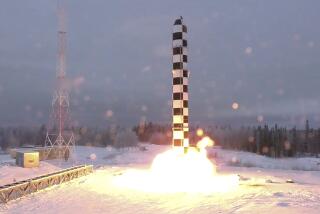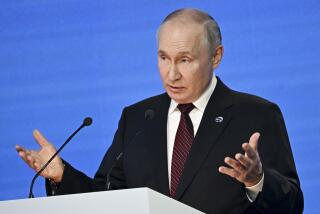Soviets to Consider U.S. A-Test Proposal
- Share via
WASHINGTON — A top Soviet arms control official said Monday that the Kremlin will seriously consider a U.S. proposal for monitoring nuclear tests and might even permit the United States to explode its own bomb at a Soviet test range to check monitoring equipment.
Nikolai F. Chervov, a Defense Ministry official who is in charge of arms reduction for the Soviet general staff, said that in such a case, the Soviet Union would expect to be permitted to explode a Soviet nuclear device at the U.S. test site in Nevada.
He also said that “the Soviet Union is prepared to accept any type of verification” on a test-ban agreement. “There is no problem on verification,” he insisted.
Chervov made his comments during a luncheon on Capitol Hill of about 50 Soviets involved in last week’s conference in Chautauqua, N.Y., on U.S.-Soviet relations.
The Soviet official told the group that willingness to accommodate U.S. efforts to verify a test-ban treaty might include adoption of the U.S. bid to implant the Cortex monitoring system at Soviet nuclear-test ranges. The system involves placing a monitoring device in a hole bored near the site of an atomic explosion.
“If you want to deploy the Cortex system, we would be prepared to consider that proposal on a mutually acceptable basis,” Chervov said. “If you want to calibrate the instruments, feel free to come to our test ranges with a nuclear device of your own, and explode it there to make sure everything is all right.”
Max M. Kampelman, the chief U.S. negotiator to arms reduction talks in Geneva, who also addressed the luncheon group, called Chervov’s comments a “new thought” worth pursuing.
“They never told us that at Geneva, but I’m glad to hear it,” he told reporters afterward, referring to the verification proposal.
Kampelman also said he was impressed that the Cortex system was mentioned, a proposal he said was put forth by President Reagan in a letter to Soviet leader Mikhail S. Gorbachev.
“I can tell you this is the first time I’ve heard that,” Kampelman said. “He (Chervov) says here verification is no problem. I can tell you I don’t know what they’ve been arguing about for months now (in Geneva) if it hasn’t been verification. To me, it’s a new thought.”
More to Read
Sign up for Essential California
The most important California stories and recommendations in your inbox every morning.
You may occasionally receive promotional content from the Los Angeles Times.













